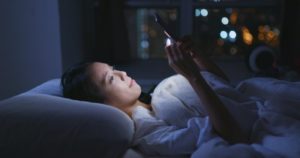Why Your Smart Phone is Making Your Sleep Apnea Worse
July 6, 2021

Screens. They are becoming more ubiquitous in our everyday lives with each passing day, offering a nearly endless source of entertainment and information. Unfortunately, they are also one of the biggest culprits behind persistent sleep issues. This is particularly true when it comes to smart phones, and if you have sleep apnea, simply using one right before bed can make getting the rest you need much more difficult. Why? Learn why putting your phone down at night might be one of the best things you can do.
Smart Phones & Sleep Apnea
Several studies have shown that smart phone usage in the evening can interfere with quality sleep, making it more difficult for someone to fall asleep, stay asleep, and wake up feeling energized. The two main reasons are:
- Blue Light: Smart phones, tablets, and TVs all emit a blue light that the brain misinterprets as sunlight. When the eyes are exposed to this light late in the evening, the brain acts as if it’s still daytime. This lowers the production of melatonin, the hormone that is necessary for sleep.
- Anxiety: Reading the news can be stressful these days, and doing so near bedtime can get someone’s mind racing, causing persistent thoughts that make it nearly impossible to drift off.
While these factors can affect anyone, they are especially harmful to those with sleep apnea because they exacerbate already compromised sleep.
What To Do Right Before Bed Instead of Using Your Phone
Forming a new routine can be a bit awkward, but by putting down your phone about 60-90 minutes before bed, you can give your body a much better chance of getting excellent sleep. Sleep doctors recommend that people try:
- Reading: This is a soothing activity that calms the brain. It’s important to note that you need to read a physical book though so you aren’t exposed to blue light!
- Listen to Music: Putting on your favorite playlist and laying down will have you falling asleep before you know it.
- Meditate: Calming your mind and body can prep you for better sleep.
When Putting the Phone Down Isn’t Enough
Of course, for people with sleep apnea, simply spending less time on their phones won’t solve all of their sleep problems. It’s also important to receive professional treatment. Combining oral appliance therapy with the practices above can make a world of difference very quickly for a sleep apnea patient. After a while, they will be getting such good sleep that they won’t even miss their phone at night!
About the Author
Dr. Ivan Paskalev is a sleep dentist with over 20 years of experience. He received his initial training at OSA University and is currently a member of the American Academy of Dental Sleep Medicine. He provides custom-made oral appliances for patients struggling with sleep apnea, and if you would be interested in getting one, you can schedule a FREE consultation by clicking here.

